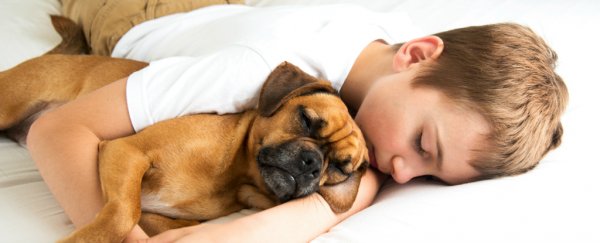Any pet owner will understand the struggle of deciding whether to sleep with your pet in your bedroom. On the one hand, you get all the cuddles, but on the other, animals can be pretty annoying when they wake up hungry at 4am.
Now the results of a small survey suggest that all that snoring/walking on your pillow in the middle of the night might be worth it, with participants reporting that sleeping with their pets made them feel more safe and secure, and helped them get a better night's rest.
This isn't a definitive study by any stretch of the imagination, so if you don't already own a pet, please don't go running out to the local shelter to adopt yourself a new bedmate. But the research, conducted by the Centre of Sleep Medicine at the Mayo Clinic in the US, is one of the first projects to look into the impact animals in the bedroom have on sleep.
As part of the survey, the researchers asked 150 people extensive questions about their sleeping habits and found that 49 percent of them had pets. Out of that group, more than half of the pets slept with their owners.
"Many pet owners view companion animals as family members that they wish to incorporate into as many aspects of their life as possible," write the researchers. "Because humans spend considerable time sleeping, a pet owner's desire to have animals close at night is understandable."
While 20 percent of pet owners said that having their pet in the bedroom was disruptive to their sleep, 41 percent claimed that it was actually beneficial, or at the very least had no impact on their rest.
One participant, a single 64-year-old woman, claimed that she felt more content when her small dog slept near her feet, and a 50-year-old woman described her cat sleeping on her chest as "soothing".
But of the 20 percent that found pets in the bedroom disruptive, the most common complaints were wandering, snoring, and whimpering. "A single 51-year-old woman kept a parrot in her bedroom that consistently squawked at 6am," report the researchers.
The study was triggered after 10 percent of the pet owners that turned up to the Mayo Clinic's sleep centre in 2013 blamed their sleep problems on their pets, at least in part. That's a jump from 1 percent in 2002, and sort of makes sense, because pet ownership is at an all-time high in the US.
Still, there are some big limitations to take into account here. First, the sample size is tiny – with only 74 pet owners being surveyed. And secondly, the entire thing is based on self-reporting of sleep quality, which isn't entirely reliable.
For example, some people often feel like they sleep well, but their deep-sleep phases might be disturbed throughout the night.
There are also a whole lot of variables that haven't been controlled for, such as whether the participants had pre-existing sleep disorders, or health problems.
But given that the presence of pets in the bedroom is getting ever-more common, it's a worthwhile area for further research. And with most pets wanting to sleep with us even if we don't want to sleep with them, it's worth knowing what we're getting ourselves into.
The research has been published in Mayo Clinical Proceedings.
